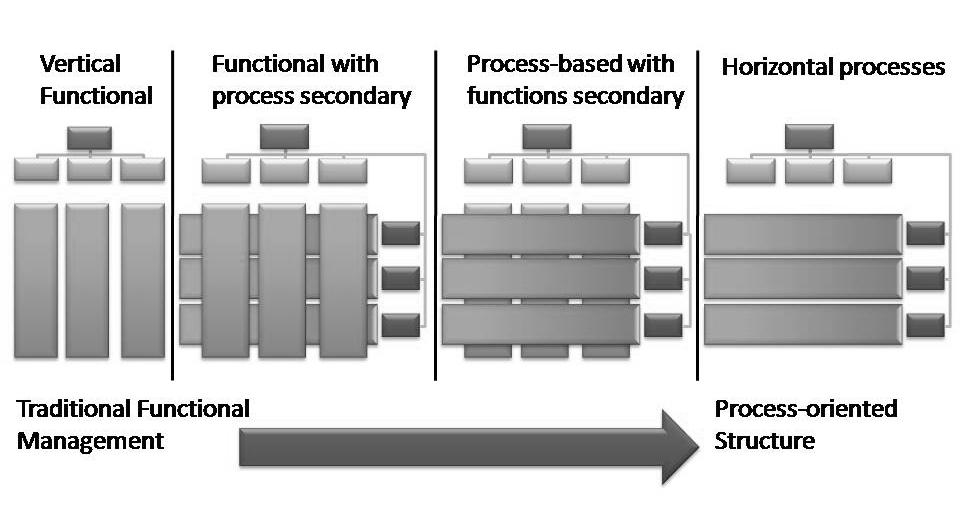1. INTRODUCTION
Organizations have been searching different ways to improve their process performance. In search of excellence, some changes can be done in their managerial patterns and practices. As stated in my previous article [9], organizations have sought concepts and guidelines towards structuring a process center of excellence – PCE [3][5]. However, there is a need for choose which managerial model will guide the PCE design and implementation. This article presents three different managerial models. Choosing one of them will influence organization and process design and performance. The paper is the second of four.
2. PROCESS MANAGEMENT MODELS
Process management has to be understood within a spectrum of operating approaches. There are three possible models: completely functional management, functional management of cross-functional processes and completely by-process management:
- Characteristically, functional management involves silos culture, poor coordination capability and, particularly, unknown processes. On this approach, objectives are primarily departmental, individual competences do not extend beyond functional boundaries, and there are no organizational units responsible for processes as a whole [10][4][8][7].
- In functional management of cross-functional processes, the model prioritizes process-based organizational management, but preserves the division of work by specialization [1]. Davenport [2] argues that process structure (rather than structure by processes) can be distinguished from the more hierarchical, vertical versions of organizational structure. While hierarchical organizational structure typically entails a fragmentary vision of responsibilities and reporting relations, process structure involves a dynamic vision of how the organization produces value [8][7].
- Process-oriented management entails altering the organizational structure and other elements of the organizational design towards prioritizing processes as a managerial dimension of greater importance than the functional dimension. The changes in the organization go beyond simply stressing processes as opposed to hierarchy and placing special emphasis on results and customers [8][7].
Organizations follow paths depending on their process management model, which usually trace a spectrum involving the three models presented above. Figure 1 shows a spectrum of process management models.

Figure 1 – Process Management Model Spectrum
There is a path from a traditional functional structure to a process-oriented structure, as shown in Figure 2. The diagram highlights the situations where processes are gradually prioritized in the structure.
Figure 2 – Path of change from a traditional functional structure to a process-oriented structure. Adapted from BPMEnterprise.
In the first image, the organization structure contains no formal representation of processes, only departments or organizational units. In the second image, cross-functional processes come to be recognized by the organization, which continues to have functional elements, but acknowledges cross-functional processes as of secondary importance, which characterizes it as a weak matrix structure. In the third image, the structure continues to be matrix, but now processes are prioritized. In the fourth image, the functional units lose importance and are often resource repositories. The cross-functional processes come to define the major dimension in which the organization constructs its organizational design.
3. FINDINGS AND CONCLUSIONS
This article presented three process management models. Organization shall analyze them and evaluate which fits better in their overall managerial model. Choosing a completely functional management is not recommended. If a functional management of cross-functional processes is chosen, the PCE will be normative focused in designing process policies, guidelines and procedures. It will also guide the way the work is coordinated. Information technology and people management will be highly process oriented.
If the option is a completely by-process management model, the PCE may move into coordinating and controlling the activities and resource allocation that occur as part of organizations’ day-to-day operations.
The case studies revealed that PCE are in most of cases responsible for process design out of a day-to-day base. It will be possible to more PCE closely associated with by-process management? More research is needed to answer that question.The previous paper presented a PCE value chain. The third will present a responsibility matrix defining which organization unit does what in process management and the last one will present PCE organization structure scenarios. This study was conducted by a team composed by Rafael Paim, Vanessa Nunes, Bruno Pinho, Flavia Santoro, Claudia Cappelli and Fernanda Baiao from GEOS/Cefet-RJ, Np2tec/Unirio & GPI/UFRJ.
4. REFERENCES
[1] Ashkenas R., Ulrich D., Jick T. & Kerr S. The Boundaryless Organization: Break the Chains of Organizational Structure. Jossey-Bass, San Francisco, 2002.[2] Davenport T. Process Re-Engineering: how to innovate in an organization through IT. (in Portuguese). Rio de Janeiro: Campus; 1993.[3] Davenport, T., The Coming Commoditization of Processes. Harvard Business Review. Vol.83. No. 6, pp. 100-108, 2005.[4] Galbraith J, Downey D, Kates A. Designing Dynamic Organizations: a hand-on guide for leaders et al. levels. New York; 2002.[5] Hammer, m. The audit process. Boston: HBR Press. 2007.[6] Harmon, P., Wolf, C., The State of Business Process Management, Business Process Trends, 2006, 2007, 2008.[7] Paim R, Caulliraux H, Cardoso R. Process Management Tasks: a conceptual and practical view. Business Process Management Journal 2008; Vol 14, N. 5, p. 694-723.[8] Paim R. The tasks for process management. Rio de Janeiro: D.Sc. Thesis (in Portuguese). COPPE/UFRJ, 2007.[9] Paim, R. Structuring a Process Management Center of Excellence: the Value Chain. BPMInstitute, February, 23, 2009.[10] Rummler G A, Brache A P. Improving Performance: How to Manage the White Space on the Organizational Chart, 2nd ed. San Francisco: Jossey Bass; 1995.


















